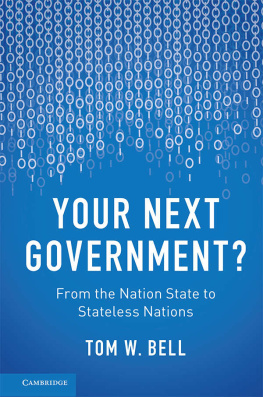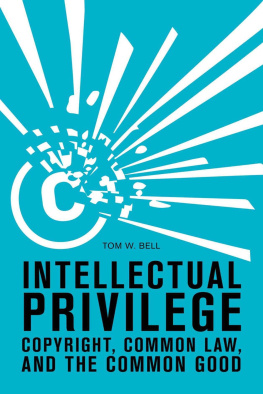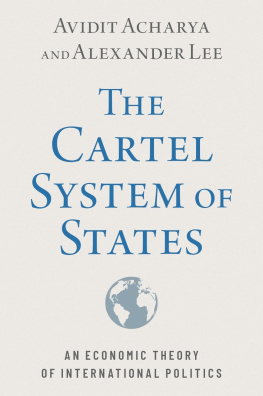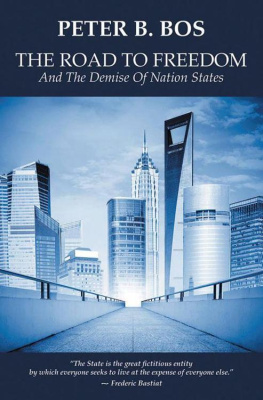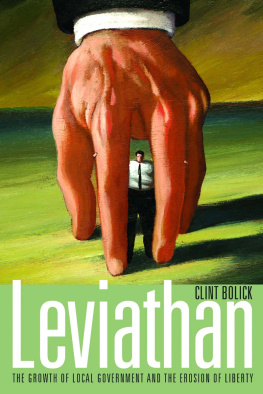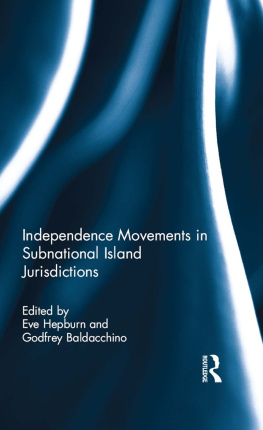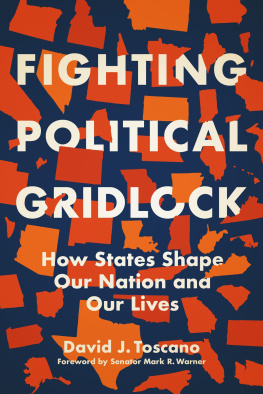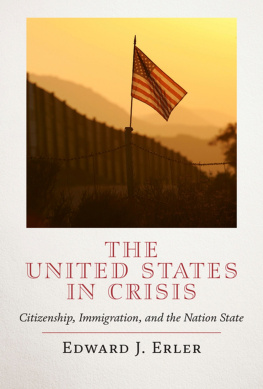University Printing House, Cambridge CB2 8BS , United Kingdom
One Liberty Plaza, 20th Floor, New York, NY 10006, USA
477 Williamstown Road, Port Melbourne, VIC 3207, Australia
4843/24, 2nd Floor, Ansari Road, Daryaganj, Delhi 110002, India
79 Anson Road, #0604/06, Singapore 079906
Cambridge University Press is part of the University of Cambridge.
It furthers the Universitys mission by disseminating knowledge in the pursuit of education, learning, and research at the highest international levels of excellence.
Tom W. Bell 2018
This publication is in copyright. Subject to statutory exception and to the provisions of relevant collective licensing agreements, no reproduction of any part may take place without the written permission of Cambridge University Press.
A catalogue record for this publication is available from the British Library.
Cambridge University Press has no responsibility for the persistence or accuracy of URLs for external or third-party internet websites referred to in this publication and does not guarantee that any content on such websites is, or will remain, accurate or appropriate.
To my father, David Glenn Bell, a civil servant who taught me how governments work and too often, do not work from the inside out, bottom up, worldwide
What Will You Choose for Your Next Government?
Suppose you want to move to another part of the country. Will you choose a traditional municipality, where political institutions provide governing services, or a private community, like a homeowners association? Or suppose you want to move to another country entirely. Now you might face a choice between a constitutional republic, parliamentary democracy, or whatever form of government seems better than the corrupt mess you want to flee.
People choose between governments every time they choose to live in a new city, state, or country. You might already have made such a choice yourself. Even if not, you still probably enjoy freedom to move but choose to stay put.
So while it may not feel much like shopping for groceries, you already enjoy a large degree of choice between governing services. And as the comparison suggests, the larger your degree of choice, the better choices you get. Competitive markets deliver the goods reliably and cheaply; political institutions not so much. Different outcomes, same rule: When suppliers compete, consumers win.
The market for governing services, never very efficient or flexible, has begun to enter a period of rapid change. Nation states, legacy monopolists that long dominated the field, now face competition from private cities, self-legislating special economic zones, and other agile new institutions. This quiet revolution, working from the inside out, stands to transform government from the province of lumbering behemoths to a network of consent-rich communities. Not another nation state; a stateless association.
So, what kind of government will you choose?
You will probably choose a good one. People like you thoughtful people; civilized people reject governments that pursue war, oppression, or pillage. Like other decent folk, you want better than that. You want your next government to nurture peace, cultivate prosperity, and protect freedom, right? Beyond that, though, the specifications probably start getting fuzzy.
Consider this book your friendly guide to the changes ahead. It will help you understand the transformation already sweeping through nation states across the globe and prepare you to exercise your growing power of choice wisely. Take it in hand, dear reader, and
make your next government your best government .
Acknowledgments
Chapman University, Fowler School of Law patiently supported the years of researching, thinking, and writing that went into this book, and for that it has my profound gratitude. Students and audiences at many various events have inspired the development of these ideas and given countless small encouragements and suggestions. Thanks also go to the many various parties who have offered up irresistible legal puzzles and adventures abroad.
For providing critical commentary on drafts of the book, thanks go to: Carlos Alejandro Pineda Pnel, Egor Ryjikov, Vt Jedlika, Mark Frazier, Patri Friedman, Octavio Rubn Snchez Barrientos, Leif Smith, Jorge Schmidt, Christine Peterson, Randy E. Barnett, Annie Eby, Fred C. Moulton, Steven J. Ware, Max Borders, Matt Miller, Jon Peters, Joe Quirk, Kelly Ryan, Johann Gevers, Alex Tabarrok, Derrik Sweeney, Donald Kochan, Antony Davies, Bart Wilson, Tom Campbell, Lotta Moberg, Michael Castle Miller, Dylan Evans, Donna G. Matias, Daniel Griswold, Jin Wang, Fred Foldvary, and Anonymous (but not that Anonymous). For research assistance, to: Sherry Leysen and those under her direction in the Hugh & Hazel Darling Law Library at Chapman University, Fowler School of Law. For financial support: The Charles Koch Charitable Foundation. Many various people and institutions contributed to the component writings that this book sometimes draws on; please see those works, cited as appropriate, for other attributions, credits, and thanks.
Thanks for helping with this book should doubtless go to more people and institutions than this comparatively brief and imperfect accounting suggests. Please accept this apology in lieu of any such oversight. The author of this book bears sole responsibility for its contents, which do not represent the views of any principal, agent, or business associate.

